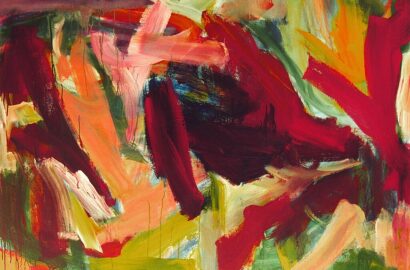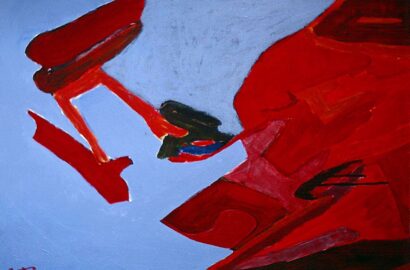Editor’s Note: This is the third and final installment in our selection of poems from Yannis Ritsos’s Exercises, a new collection of translations by Spring Ulmer, published by Ugly Duckling Presse. We’re delighted to showcase work by this poet of conscience, who was a member of the Greek resistance during World War II and later spent several years in prison camps during more than one authoritarian dictatorship, including the military junta that controlled Greece from 1967 to 1974. We are pleased to publish the poems in Greek and English, and to celebrate the legacy of this essential voice, whose example remains meaningful and necessary—not only in regard to his own moment but also in regard to the world in which we find ourselves.
EARLY RAINS
The rain came suddenly, at a time you didn’t expect,
in the middle of a bright day and fell upon the glorious fruit. By
daybreak,
after the women opened the windows, it all
had changed—things were heavy and fresh. And everyone felt
as if someone had cheated them. It wasn’t, though,
like they were angry—only sullen and quiet.
The soothing fragrance of the fields entered the houses
like a big apology before realizing its mistake. Then
with sacks that once carried grapes,
they made an effigy of summer and filled it
with hay and stray momentos. For a minute
you thought they would burn it in the square
like some final hurrah, like unexplained revenge. But, no—
they left it there in the yellow desolation of September—
a thatched statue, soaking uncomplainingly in the soft rain.
⸻
ΠΡΩΤΟΒΡΟΧΙ
Ἤρθε ἄξαφνα ἡ ϐροχή, τὴν ὥρα ποὺ κανεὶς δὲν τὴν περίμενε,
καταμεσὶς στὶς φωτεινὲς ἡμέρες καὶ στοὺς ἔνδοξους καρποὺς. Μὲ τὰ
χαράματα,
ὅταν ἀνοιξαν οἱ γυναῖκες τὰ παράθυρα, ὅλα
εἶχαν ἀλλάξει—μολυϐένια καὶ νωπά. Κι ὅλοι ἔνιωσαν
σὰν κάποιος νὰ τοὺς εἶχε ἀπατήσει. Δὲν εἶταν, ὡστόσο,
καθόλου ὀργισμένοι—μόνον σκυθρωποὶ κι ἀμίλητοι.
Ἡ κατευναστικὴ εὐωδιὰ τῶν χωραφιῶν ἔμπαινε μὲς στὰ σπίτια
σὰν μιὰ πλατειὰ συγγνώμη πρὶν γνωρίσουν τὸ λάθος τους. Τότε
μὲ τὰ τσουϐάλια, ποὺ μετέφεραν ἄλλοτε σταφύλια,
φτιάξαν ἕνα χοντροκομμένο ὁμοίωμα τοῦ καλοκαιριοῦ καὶ τὸ γέμισαν
μὲ ἄχυρα καὶ μὲ σκόρπια ἐνθύμια. Γιὰ μιὰ στιγμὴ
νόμισες πὼς θὰ τὄκαιγαν στὴν ἀπάνου πλατεία
σὰν τελευταία λαμπρότητα, σὰν μιὰ ἀνεξήγητη ἐκδίκηση. Ὅμως, ὄχι—
τὸ ἄφησαν ἐκεῖ ἐγκαταλειμμένο στὴν κίτρινη ἐρημιὰ τοῦ Σεπτέμϐρη
—ἕνα ἅγαλμα ἀχυρένιο, νὰ μουσκεύει ἀδιαμαρτύρητα στὴ σιγανὴ ϐροχή.
GREEK DRAYMEN
Late noon, after selling their produce
—greens, grapes, pears—at the outdoor market,
they turn their carts off the seaside road
returning to their small, distant farms,
sweating together with their horses,
banknotes tied up in their handkerchiefs,
and coins jingling in their pockets,
foolish, bone-tired, almost savage,
scarred by hard work and injustice,
with cowlicks of tough hair, and dust and sweat
caked up under their caps.
But, as if turning from the public, as if lawlessly,
at the first deserted sandy beach, they unharness their horses,
hurriedly undress, their clothes flying onto the stones,
and head out into the sea to wash their horses.
And then, drenched, naked, and golden, human and horse,
they glisten in the sun with saintly chivalry,
industrious and almighty, as if birthed from
ancient myths. The youngest drayman,
just eighteen years old, all aglitter at noon,
naked, astride his horse, galloped across the sea,
while a white cloud marked his shadow in the blue.
And at the beach, the carts, also golden,
shimmered in the circular reflections of their wheels,
as if famed chariots from ancient Greek races
had simply stopped here and now were moving again.
⸻
ΕΛΛΗΝΕΣ ΚΑΡΑΓΩΓΕΙΣ
Ἀργά, κατὰ τὸ μεσημέρι, ὅταν πουλήσουν στὸ παζάρι
τὰ προϊόντα τους—λαχανικά, σταφύλια, ἀχλάδια—
γυρίζουν μὲ τὰ κάρα τους ἀπ’ τὸν παραθαλάσσιο δρόμο
πρὸς τὰ μικρά τους κτήματα, τὰ μακρινά,
κάθιδροι, αὐτοὶ καὶ τ’ ἄλογά τους,
μὲ τὰ χαρτονομίσματα δεμένα στὸ μαντήλι τους
καὶ μὲ τὰ κέρματα νὰ κουδουνίζουνε στὶς τσέπες τους,
ἀνόητοι, τσακισμένοι, σχεδὸν ἄγριοι,
μὲ τὸ θυμὸ μιᾶς ἄγνωστης ἀργοπορίας κι ἀδικίας,
μὲ τὰ τσουλούφια τῶν σκληρῶν μαλλιῶν τους ὅλο σκόνη καὶ ἵδρωτα
χτισμένα κάτω ἀπ’ τὸ κασκέτο τους.
Ὅμως, σὰν στρίψουνε τὴ δημοσιά, σὰν ἀνταμώσουν
τὴν πρώτη ἐρημικὴ ἀμμουδιά, ξεζεύουν τ’ ἄλογά τους,
γδύνονται ϐιαστικά, πετοῦν τὰ ροῦχα τους στὶς πέτρες
καὶ μπαίνουνε στὴ θάλασσα νὰ πλύνουν τ’ ἄλογά τους.
Καὶ τότε, μουκεμένοι, ὁλόγυμνοι κι ὁλόχρυσοι, ἄνθρωποι κι ἄλογα,
ἀστράφτουν μὲς στὸν ἥλιο μὲ μιὰ ὑψηλὴν εὐγένεια
ἐργατικοὶ καὶ παντοδύναμοι, σάμπως νὰ ϐγῆκαν
μὲς ἀπὸ τοὺς πανάρχαιους μύθους. Ὁ μικρότερος καραγωγέας,
μόλις 18 χρονῶ, στίλϐοντας ὅλος μὲς στὸ μεσημέρι,
γυμνός, καϐάλλα στ’ ἄλογό του, κάλπασε πέρα στὴ θάλασσα,
ἐνῶ ἕνα σύννεφο λευκὸ σημάδευε τον ἴσκιο του μὲς στὸ γαλάζιο.
Καὶ στὴν ἀκρογιαλιά, τὰ κάρα, ὁλόχρυσα κι αὐτά,
ἔλαμπαν μὲς στὶς κυκλικὲς ἀνταύγειες τῶν τροχῶν τους
σὰν ἔνδοξα ἅρματα ἀπὸ τοὺς ἀρχαίους ἑλληνικοὺς ἀγῶνες
ποὺ ἐδῶ σταμάτησαν καὶ ποὺ ἀπὸ δῶ καὶ πάλι θὰ ξανάρχιζαν.
A DESERTER’S RETURN
He felt restless these days, like a guard who had quit his watch,
leaving the state unguarded. For some time,
he feared they had discovered his insubordination,
and that it would be his fault the city would fall. A deserter,
hidden in the bushes, he couldn’t see the walls,
could only imagine the dire consequences for the unguarded
citizens
and above all for himself. Later, he learned
that the city didn’t fall, and that no one noticed his absence.
They didn’t even look for him. He wasn’t found in the directories
of the rescued, the lost, or the missing. Around him,
an enormous, worthless silence began to spread. And it was now
this that tormented him—this
he so often dreamed about. As night fell, outside his house, he
sensed
thousands of shadows gliding like stray cats
through thorns of the deserted land; and hanging in his closet
he felt his suits, flabby as the dead’s hand-me-downs. Then
he gripped his gear tightly to his chest,
as if it was a bundle of all his necessities,
and arrived at the guardhouse on time.
⸻
Η ΕΠΙΣΤΡΟΦΗ ΕΝΟΣ ΛΙΠΟΤΑΧΤΗ
Ἔνιωθε ἀνήσυχος τοῦτες τὶς μέρες, σὰ φρουρὸς ποὺ παράτησε τὴ ϐάρδια
του,
ἀφήνοντας ἀφρούρητη τὴν πολιτεία. Γιὰ καιρό,
εἶχε τὸ φόϐο μὴν ἀνακαλύψουν τὴν ἀπειθαρχία του,
μὴν ἔπεσε ἡ πόλη ἀπὸ δικό του λάθος. Λιποτάχτης,
κρυμμένος μὲς στὰ θάμνα, δὲ διέκρινε τὰ τείχη,
μονάχα φανταζόνταν τρομερὲς συνέπειες γιὰ τοὺς ἀφρούρητους πολίτες
καὶ προπαντὸς γιὰ τὸν ἴδιο τὸν ἑαυτό του. Ἀργότερα, ἔμαθε
πὼς ἡ πόλη δὲν ἔπεσε, καὶ πὼς κανένας δὲν πρόσεξε τὴν ἀπουσία του.
Δὲν τὸν ἀναζητῆσαν κάν. Δὲ ϐρέθηκε στοὺς καταλόγους
τῶν διασωθέντων, τῶν ἀπολεσθέντων μήτε τῶν ἀγνουμένων. Γύρω του,
ἁπλώθηκε ἄχρηστη μιὰ πελώρια ἡσυχία. Κ’ εἶταν, τώρα,
αὐτὴ ποὺ τὸν ϐασάνιζε—αὐτὴ
ποὺ τόσον εἶχε ὀνειρευτεῖ. Ἔξω ἀπ’ τὸ σπίτι του, ἔνιωθε, σὰν νύχτωνε,
χιλιάδες ἴσκιους νὰ γλυστροῦν σὰν ἀδέσποτες γάτες
στ’ ἀγκάθια τοῦ ἔρημου γήπεδου· καὶ μέσα στὴ ντουλάπα του
ἔνιωθε κρεμασμένα, πλαδαρὰ τὰ κοστούμια σὰν ἀποφόρια πεθαμένων.
Τότε
ἔσφιξε τὴν ἐξάρτυσή του χιαστὶ στὸ στῆθος του,
σὰ νἄδενε ἕνα μπόγο μὲ ὅλα του τὰ χρειαζούμενα
κ’ ἔφτασε στὸ φυλάκιο ἀκριϐῶς στὴν ὥρα του.
ALIENATION
A flower, alone, engulfed in its fragrance;
a face anchored in its smile;
—is there? isn’t?—vanishes;
if you talk, it will grow embarrassed, awkward, as if thousands
of years had passed—it will not know what it is, it will not know
which expression to have, where to get an answer.
There’s a stone altar on a deserted road.
Sometimes, at dusk, its icon descends
the two marble steps, gathers wildflowers
between the stones, makes a garland
and hangs it on its own altar. Other times,
some stray lamb stands there,
in front of the altar, maybe praying,
chewing the dried garland slowly, inconceivably.
⸻
ΑΠΟΞΕΝΩΣΗ
Ἕνα λουλούδι, μόνο, ϐουλιαγμένο μέσα στὸ ἄρωμά του·
ἕνα πρόσωπο, ἀγκυροϐολημένο μέσα στὸ χαμόγελό του·
—ὑπάρχει; δὲν ὑπάρχει;—χαμένο·
ἂν τοῦ μιλήσεις, θὰ στρέψει σὰν ἀπὸ χιλιάδες χρόνια,
ἀμήχανο, ἀδέξιο,—δέ θὰ ξέρει ποῦ εἶναι, δὲ θὰ ξέρει
ποιὰν ἔκφραση νὰ πάρει ποὺ νἆναι μιὰ ἀπάντηση.
Εἶναι ἕνα εἰκονοστάσι πέτρινο σ’ ἕναν ἔρημο δρόμο.
Κάποτε, μὲ τὸ σούρουπο, αὐτὴ ἡ εἰκόνα κατεϐαίνει
τὰ δυὸ μαρμάρινα σκαλιά, μαζεύει ἀγριολούλουδα
ἀνάμεσα στὶς πέτρες, φτιάχνει ἕνα στεφάνι
καὶ τὸ κρεμάει στὴν ἴδια τὴν εἰκόνα της. Καμιὰ φορά,
κάποιο ξεστρατισμένο πρόϐατο στέκεται ἐκεῖ,
μπροστὰ στὸ εἰκονοστάσι, σάμπως νὰ προσεύχεται,
μασώντας ἀργά, ἀδιανόητα τὸ ξεραμένο πιὰ στεφάνι.
_________
From Exercises 1950–1960 by Yannis Ritsos (Ugly Duckling Presse, 2025). Translation Copyright © Spring Ulmer, 2025.



